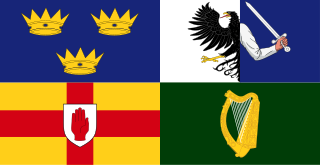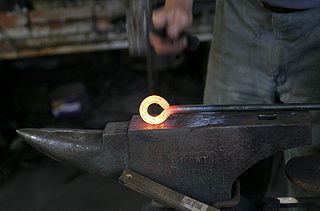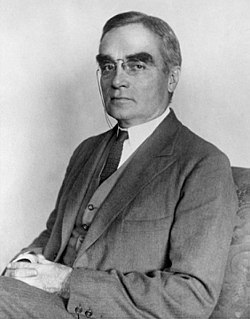A surname, family name, or last name is the portion of a personal name that indicates a person's family. Depending on the culture, all members of a family unit may have identical surnames or there may be variations based on the cultural rules.
Dick, Dicks, or Dick's may refer to:
Dyke or dike may refer to:

William Learned Marcy was an American lawyer, politician, and judge who served as U.S. Senator, Governor of New York, U.S. Secretary of War and U.S. Secretary of State. In the latter office, he negotiated the Gadsden Purchase, the last major acquisition of land in the continental United States.

The Irish are a Celtic nation and ethnic group native to the island of Ireland, who share a common Irish ancestry, identity and culture. Ireland has been inhabited for about 12,500 years according to archaeological studies. For most of Ireland's recorded history, the Irish have been primarily a Gaelic people. Viking invasions of Ireland during the 8th to 11th centuries established the cities of Dublin, Wexford, Waterford, Cork and Limerick. Anglo-Normans conquered parts of Ireland in the 12th century, while England's 16th/17th-century (re)conquest and colonisation of Ireland brought a large number of English and Lowland Scots people to parts of the island, especially the north. Today, Ireland is made up of the Republic of Ireland and the smaller Northern Ireland. The people of Northern Ireland hold various national identities including British, Irish, Northern Irish or some combination thereof.
Patel is an Indian surname originally representing a community of agriculturalists and merchants, predominantly in the state of Gujarat, India. Once considered to be a status name of referring to village headsmen during medieval ages, the surname was later adopted by various community of land owners including the Patidars, Kolis, some Parsis and Muslims. Today, there are currently two major branches of people bearing the surname: Leuva and Kadva. The branches are distinguished mainly by geographic location and varying cultural practices. There are roughly 500,000 Patels outside India, including 150,000 in Britain and 150,000 in the US. Nearly 1 in 10 people of Indian origin in the US is a Patel.
Lamb or The Lamb may refer to:

Smith is a surname originating in England. It is the most prevalent surname in the United Kingdom, Australia, Canada, New Zealand and the United States, and the fifth most common surname in the Republic of Ireland. The surname Smith is particularly prevalent among those of English, Scottish and Irish descent, but is also a common surname among African Americans, which can be attributed either to black slaves being given the surname during slavery and never changing the name upon the end of the era of slavery and after the issuance of the Emancipation Proclamation or to descendants of interracial marriages. 2,376,206 Americans shared the surname Smith during the 2000 census, and more than 500,000 people share it in the United Kingdom. At the turn of the 20th century, the surname was sufficiently prevalent in England to have prompted the statement: "Common to every village in England, north, south, east and west"; and sufficiently common on the (European) continent to be "common in most countries of Europe".
Goff is a surname with several distinct origins, mainly Germanic, Celtic, Jewish, and French. It is the 946th most common family name in the United States. When the surname originates from England it is derived from an occupational name from German, Cornish and Breton. The German Goff means a godly person, a strong warrior, or a priest. The Breton goff means "smith". The English-originating surname is common in East Anglia, where it is of Breton origin. The Welsh name is a variant of the surname Gough, and is derived from a nickname for someone with red hair. The native Irish name is derived from a patronymic form of the Gaelic personal name Eochaidh/Eachaidh, which means "horseman".
Miller and Millar are surnames of English language, Old English or Scottish origin. There are two homonymous forms of Miller, one that began as an occupational surname for a miller and another that began as a toponymic surname for people from a locale in Glasgow. Miller of the occupational origin may also be translated from many cognate surnames from other European languages, such as Mueller, Müller, Mühler, Moller, Möller, Møller, Myller, and others. There is also a form in the early English lingusitics as Milleiir.

Moore is a popular English-language surname. It is the 34th most common surname in Australia, 32nd most common in England, and was the 16th most common surname in the United States in 2000.
Jang, Chang and Zang are romanizations of the common Korean surname 장, previously several separate surnames derived from the Chinese surnames Zhang, Zhang (章), Zhuang (莊) and Jiang (蔣).

The American Society of International Law (ASIL), founded in 1906, was chartered by the United States Congress in 1950 to foster the study of international law, and to promote the establishment and maintenance of international relations on the basis of law and justice. ASIL holds Category II Consultative Status to the United Nations Economic and Social Council, and is a constituent society of the American Council of Learned Societies.
Hanratty is a surname, and may refer to:
English Americans are Americans whose ancestry originates wholly or partly in England.
In the 2017 American Community Survey, English Americans are (7.1%) of the total population.






